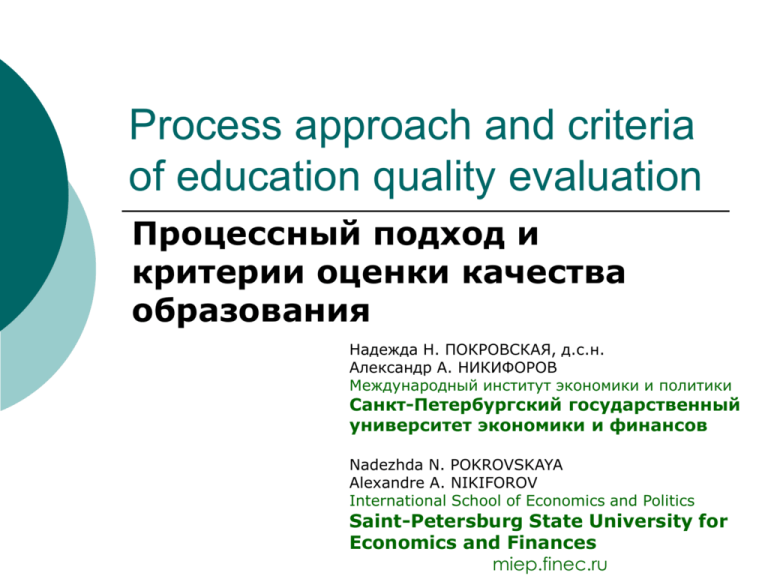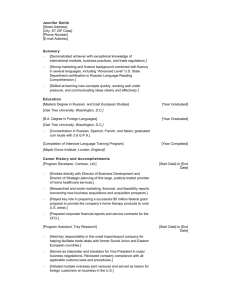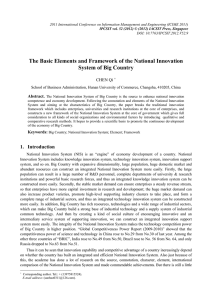Process approach and criteria of education quality evaluation
advertisement

Process approach and criteria of education quality evaluation Процессный подход и критерии оценки качества образования Надежда Н. ПОКРОВСКАЯ, д.с.н. Александр А. НИКИФОРОВ Международный институт экономики и политики Санкт-Петербургский государственный университет экономики и финансов Nadezhda N. POKROVSKAYA Alexandre A. NIKIFOROV International School of Economics and Politics Saint-Petersburg State University for Economics and Finances miep.finec.ru Process approach An activity using resources, and managed in order to enable transformation of inputs into outputs, can be considered as a process. Often the output from one process directly forms the input to the next The process approach is a management strategy Understanding and meeting requirements Considering processes in terms of added value Obtaining results of process performance and effectiveness Continual improvement of processes based on objective measurement The process approach in educational programmes Procedures Process Objectives Principles Principles Educational “market” – competitiveness of courses and of Universities with equal access for the talented people Innovative and flexible human resource, openness to the new and to the other Individualisation – to maximise the benefit by individual talents and skills Social competences – team-work skills and understanding of social impact of a business’ decision Sustainable development and long-term economic growth – the skilled human resources is today the key basis of the country’s development Objectives = General criteria International cooperation between universities, firms and individuals Mutual cultural enrichment, openness and mutual understanding Economic and social growth of the involved countries Professional competencies Personality’s development Creation of new international companies and concluding contracts International events organised by graduated students Growth of GDP and of living standards Employment of graduated students Process – 1 Educational Programme creating Quality criteria To meet the employers interest – asking them To meet the labour market – analyse the vacancies and the jobs descriptions To meet the students interest – revealing target groups of students / professionals To meet the industries interest – revealing the groups of enterprises and organisations to hire graduated students Process – 2 Internal work of University / Universities Accordance of the programme field to the University / Universities strong point Interested and involved persons their existence their availability Reactivity of interlocutors The attention paid to Quality criteria Urgent communication Correct design of documents Formal requirements and hierarchy Getting grants and searching for sponsoring Process – 3 Student selection Quality criteria teaching process Quality of course syllabus and curriculum (CV) faculty infrastructure scientific-research work and research projects Bachelor of Master thesis Competition to enroll Enrolling rules and criteria Administrative documents Curricula, Courses’ syllabus Pedagogical staff Pedagogical materials Access and using infrastructure Examination rules and scores Link to professional environment Application of students’ works in enterprises Process – 4 Diploma Type of the diploma: national State diploma? European certificate? Etc. Application of students’ works in enterprises Employment of graduated students Quality criteria Employment / unemployment Companies’ types – according to the diploma field Job’s types – what kind of activity? Job’s description – what competences and skills? Creation of new enterprises by graduated students Procedures – example of Teachers’ evaluation The teacher’s attestation criteria: Teaching experience: how long? what courses? Degrees and titles Position in the University, Functions in the University and other organisations Publications in national and international sources Professional experience, including the consulting works Foreign languages Openness to foreign experiences and traditions Pedagogical abilities Interest and ability to us the modern technologies Students’ rating Personality characteristics ... Conclusion University should operate within a mixed quality management approach total quality management conformance to specifications paradigms balanced “resources – process” approach The process approach is based upon good management practice ISO 9001 – 2000 Thank you!




